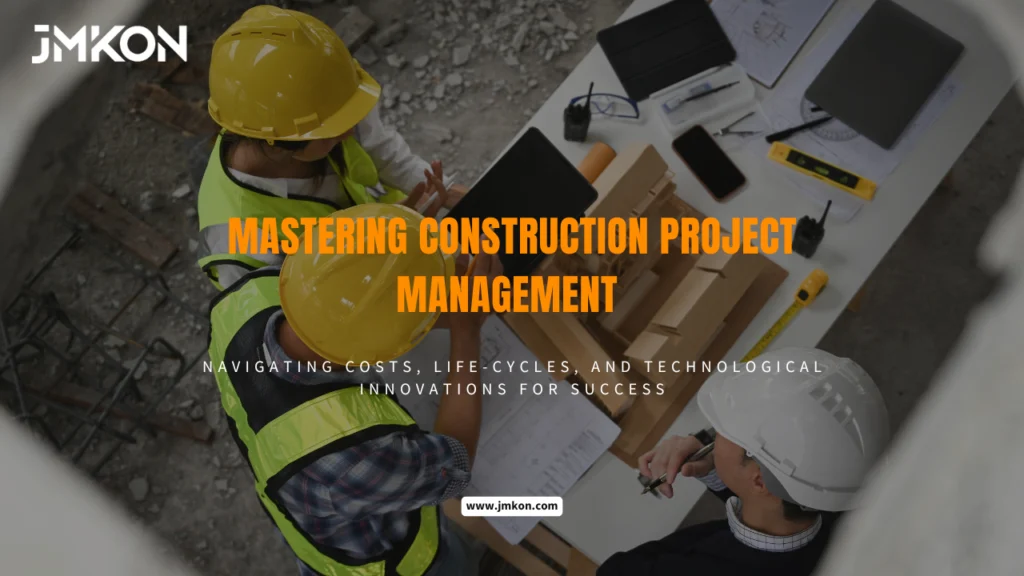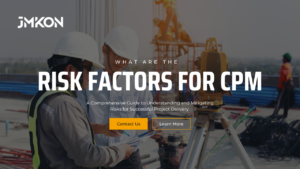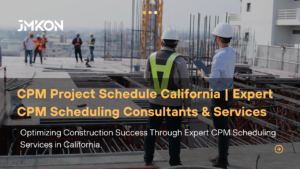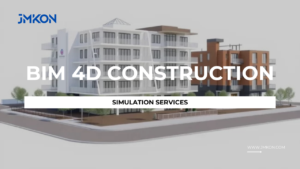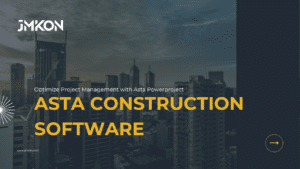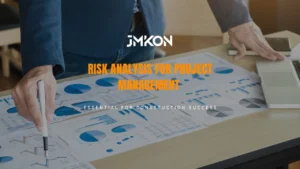Managing project management for construction projects is much more than juggling timelines and budgets; it’s about orchestrating a symphony of moving parts—people, resources, regulations, and unforeseen challenges. Construction project management is the art and science of ensuring that all these components align to deliver a structure that meets client expectations without compromising on quality, time, or cost.
Every project tells a story of collaboration and complexity. From the initial blueprint to the final handover, the stakes are high. Small missteps in planning or execution can spiral into delays or budget overruns, highlighting the need for a systematic approach. Understanding the construction project lifecycle and the financial dynamics within each phase is vital to avoiding these pitfalls.
At JMKON, we go beyond conventional practices. By combining advanced technologies, like AI-powered tools, with a deep understanding of industry dynamics, we craft customized solutions for each project. Our expertise ensures that every project we manage not only meets expectations but sets new benchmarks for efficiency and innovation.
This is not just about managing construction projects; it’s about redefining what success looks like in an ever-evolving industry.
Affect of project management for construction projects
While the terms construction management and project management for construction projects are often used interchangeably, they differ significantly in scope, roles, and goals. Construction management focuses on overseeing the actual construction process, ensuring that the project is built to specifications, meets safety standards, and adheres to schedules. In contrast, construction project management encompasses a broader scope, addressing not only the construction phase but also planning, budgeting, resource allocation, and risk management.
Think of project management for construction as being hands-on with the “how” of construction—coordinating contractors, managing on-site operations, and resolving day-to-day challenges. On the other hand, construction project management is the strategic backbone that guides the “why” and “what,” defining the project’s overall vision and ensuring that every stage aligns with client goals.
These two disciplines are deeply interconnected. Effective project management integrates seamlessly with construction management by providing a structured framework for decision-making, communication, and resource coordination. For example, at JMKON, we bridge these roles by leveraging advanced tools like CPM Scheduling to align high-level planning with on-ground execution, minimizing delays and conflicts.
Impact on Project Outcomes
Proper project management for construction projects has a direct and measurable impact on project success. By maintaining tight control over schedules, costs, and quality, project management for construction projects ensures that projects are delivered as planned—if not better.
Timelines
Effective management ensures that milestones are met by anticipating potential delays and proactively resolving them.
Costs
A well-managed project keeps budgets under control by identifying inefficiencies early. When integrated with project management, cost management becomes even more robust, balancing expenses with resource availability and client priorities.
Quality
Project management for construction ensures that the finished product meets or exceeds industry standards. By maintaining rigorous quality checks throughout the process, defects and rework are minimized, saving both time and money.
Real-World Example
Imagine a commercial high-rise project where unexpected supply chain issues threaten to delay completion. With proper integration between project and project management for construction projects, alternative suppliers can be identified, schedules adjusted, and workflows optimized to minimize disruption. This proactive approach not only avoids delays but also mitigates financial losses, boosting ROI.
Understanding the Construction Project Management Lifecycle
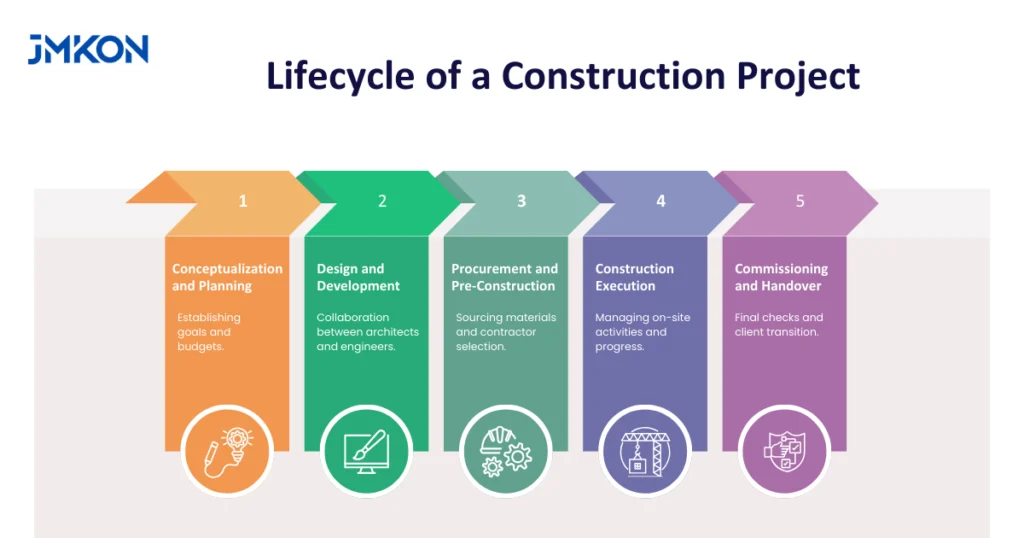
The construction project lifecycle is a structured sequence of phases, each critical to the success of a project. Understanding these stages ensures efficient execution and seamless transitions.
1. Conceptualization and Planning
This is the foundation of the project, where goals, feasibility, and initial budgets are established. Key tasks include defining project scope, conducting site analyses, and assembling a skilled team.
2. Design and Development
In this phase, architects, engineers, and consultants collaborate to produce detailed designs and technical specifications. Clear communication between stakeholders ensures that designs align with project objectives and regulations.
3. Procurement and Pre-Construction
The procurement phase involves sourcing materials, selecting contractors, and setting up the site for construction. Pre-construction tasks, such as obtaining permits and finalizing schedules, are completed to pave the way for a smooth execution phase.
4. Construction Execution
This is where plans come to life. Teams coordinate on-site activities, manage labor, and monitor progress closely to ensure adherence to timelines and quality standards. Regular updates and inspections help identify and address any issues promptly.
5. Commissioning and Handover
In the final phase, systems are tested, and the completed project is handed over to the client. Thorough documentation and training ensure the client can effectively manage and operate the facility.
Cost Implications in Each Phase
Costs vary significantly across the construction project lifecycle, and managing them effectively is crucial for project success.
- Conceptualization and Planning: This phase demands investment in feasibility studies and preliminary designs. Strategic planning ensures budgets are realistic and comprehensive.
- Design and Development: Costs are driven by detailed design work and professional consultations. Optimizing designs to reduce waste and ensure efficiency can save significantly down the line.
- Procurement and Pre-Construction: Material costs and site preparation represent major expenses. Bulk purchasing and supplier negotiations play a key role in cost control.
- Construction Execution: Labor and material expenses dominate this phase. Effective on-site management prevents cost overruns due to delays or rework.
- Commissioning and Handover: While this phase has minimal costs compared to others, quality assurance testing and documentation still require careful budgeting.
Construction Project Management Best Practices
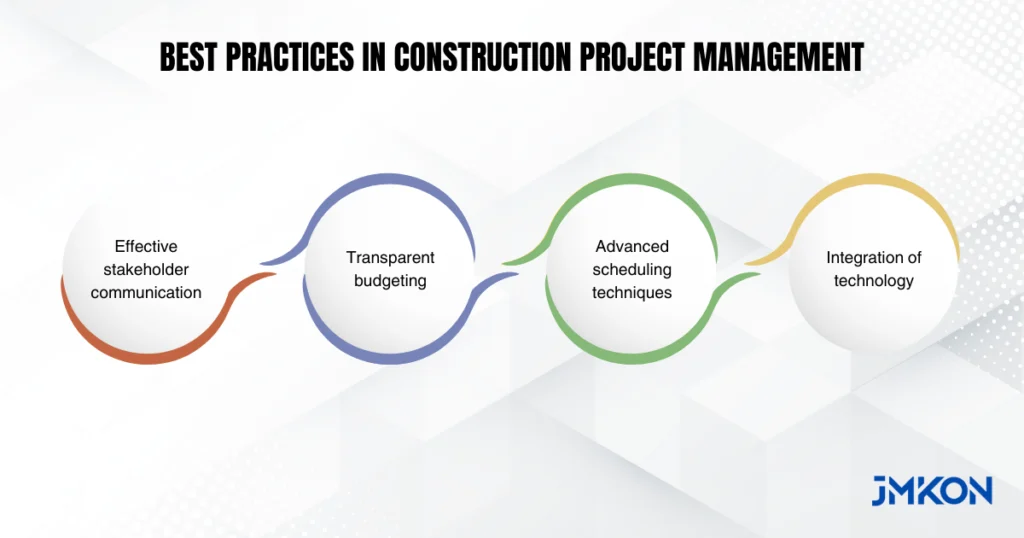
Achieving success in project management for construction projects requires a set of proven strategies tailored to address the complexities of modern construction. Below are key practices that ensure projects are delivered efficiently and effectively:
- Effective Stakeholder Communication: Clear and continuous communication with stakeholders is vital for managing expectations and resolving conflicts. Regular updates through meetings, reports, and digital collaboration tools help keep everyone aligned.
- Transparent Budgeting and Cost Management: Openly sharing budget details with stakeholders builds trust and ensures accountability. A well-structured budget, with contingencies for unforeseen expenses, minimizes financial surprises.
- Use of Cutting-Edge Scheduling Techniques: Leveraging tools like CPM Scheduling allows project managers to visualize timelines, identify critical paths, and allocate resources effectively. This ensures deadlines are met without unnecessary delays.
Tools and Technologies
Modern project management for construction projects heavily relies on technology to streamline operations and improve accuracy. Essential tools and construction project management Software include:
- Building Information Modeling (BIM): Enables detailed 3D modeling and coordination across project teams.
- Collaboration Platforms: Cloud-based platforms like Procore facilitate seamless communication and document sharing among stakeholders.
At JMKON for Construction Project Management, we integrate these technologies to enhance project efficiency.
Lessons Learned from Past Projects
Following best practices consistently leads to measurable success. For example:
- In a recent industrial project, applying CPM Scheduling allowed for the identification of bottlenecks early on, saving two months in project timelines.
- On a residential construction project, using collaboration tools streamlined stakeholder communication, leading to quicker decision-making and increased client satisfaction.
Call Us Today:
New York: (646) 847-1100
Texas: (214) 306-5834
California: (213) 293-4140
Our Addresses:
105 West 125th #1408, New York, NY 10027
1942 W Gray St #1184, Houston, TX 77019
3680 Wilshire Blvd Ste P04 – 1138, Los Angeles, CA 9001
Send Us a Mail:
info@jmkon.com
